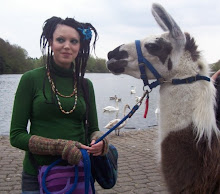The other day I heard a group of people bemoaning their Christmas poultry. Turkeys, they say, are dry. They would rather not eat them, but that is what they are given. They talk about how they leave them on the plate, or how they endure them with no satisfaction. Yet still they eat them.
As they are defiling the bird does the thought never cross their mind that before being on their plate causing such offence and displeasure it was actually a living, breathing creature? I shouldn't think the turkey much wants to be eaten, never mind being eaten by people who actually don't even like it.
I found the whole conversation offensive. I have actually been vegetarian for 13 years now (with a brief period of pescetarianism, which has long since passed, save for a very short fish eating holiday whilst in Japan, it didn't make me feel big or clever, and was only ever a foray). A few years ago I started to only eat organic dairy and eggs (except for some local eggs from a local farmer who only keeps a small colony and doesn't debeak - so essentially organic except for the feed, organic in terms of welfare) due to living conditions. The deal breaker with the eggs was when i found out that free range egg-laying chickens are frequently debeaked.
About 18 months ago though a realisation, that I think I had been suppressing, came to the forefront of my mind like a thunder clap, and it's hung around like a bad smell since, if it's OK to mix metaphors like minestrone soup. I realised that my whole moral position was invalid.
I became vegetarian after learning about the conditions in which meat animals are kept and killed. Not so much that they are actually killed, more the way in which they were. With time I felt less strongly about this, and more about the health benefits of limiting (to zero in this case) meat intake and increasing plant based foods. Now my position is a mixture of both of those and also more strongly the eco argument. I think it would be fair to say I was an
environmental vegetarian.
I haven't actually read that article but in short I believe it is very inefficient in terms of food, water and fuel to eat a meat based diet. I also believe the meat industry to be more polluting, and in some cases toxic. I understand there is a book I need to read called
The Vegetarian Myth which deals with whether this is actually the case. At this stage I will state that I have always said that if we were to go back to traditional farming methods and crop rotations and as such we needed animals for manure that I would not really know where I stood. Although I don't see why we would need to eat the animals until they died of natural causes anyway, and at that point there wouldn't be enough for everyone to eat... Anyway, I digress.
So, environmental vegetarian, yes? Yep. Except that then, as I was saying before, I realised my entire moral view fell down. What about the food, water, fuel and pollution associated with the egg and dairy industry? What about the young cockerels and the young calves condemned to death by those same industries? Wasn't I just supporting those? Oh dear. So I toyed with becoming vegan, and this is where I think the morality lies. It's just such a lifestyle change that I don't think I can be bothered. What a weak argument. It guilts me to think that thought let alone say it out loud or blog about it!
I decided to become a "social vegetarian", that is akin to a social smoker where one is a non-smoker except in social situations. I would be a non-vegetarian except in social situations (people's houses, restaurants etc). I would not want to use the word vegan and water down the tremendous will power and effort put in by people who do eliminate ALL animals products from their lives. I did very well for about 7 months - I did still eat eggs, but stopped drinking cows milk, only rarely ate cheese, bought soya alternatives etc. I don't eat a dairy marg anyway. I don't really know what happened with all that. I think I will start it up again. In fact I see a challenge coming on - vegan for a week, how do I do? Then I can try a month etc.
I was having a conversation with a fellow vegetarian last night, I was saying I should grow some backbone and give up eggs and dairy, and he was agreeing, saying he was from a hindu family and that he believed the hindu diet to be the most moral. Then some other people joined in, a couple, where one would like to be vegetarian and one wouldn't, and the one that would feels she can't because of the one that won't. Then someone else joined in saying, "There is no such thing as vegetarian anyway, only carnivores and vegans".
What a crock of shit. What am I then? A carnivore? Hrmmm. I mean, I know she is making my argument (with a thai chicken curry on
her plate, mind), but I do believe that anything you do is better than doing nothing.
Of course even what seems to be such a simple line of reasoning such as this does throw open conundrums... Packing, storage and transportation of vegan products may be less energy efficient for starters.
Soya has its own anti-arguments, but there are other alternatives to soya. Not
Tiger White though, my god, that substance sounds like the answer, but tastes like the devil! I am a firm believer that you can make yourself like anything if you just keep eating it. Anything except Tiger White.


